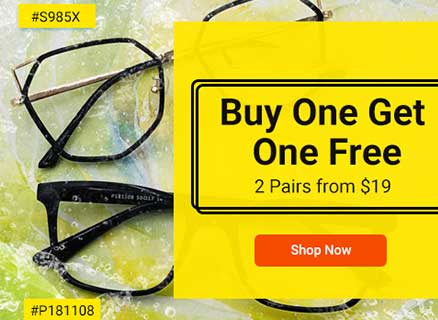
Polycarbonate lenses eyeglasses are eyeglasses with lenses made of polycarbonate, a durable, cheap plastic. Polycarbonate was developed in the 1950s and was soon recognized as a dynamic substitute for glass. In the 1980s, polycarbonate glasses were introduced to consumers as a safe, affordable alternative to standard plastic or glass eyeglass lenses.
Polycarbonate lenses have significant benefits over other forms of lenses on the market. In addition to their excellent impact resistance, polycarbonate glasses are up to 40% thinner and one-third lighter than standard plastic lenses. These properties make polycarbonate glasses ideal for people with high prescriptions. Polycarbonate glasses, however, are not perfect. As a result of their ability to absorb impact, the lenses are soft and therefore more susceptible to scratches. To compensate for this, scratch-resistant coatings have been developed and can be added to polycarbonate glasses to provide added durability. All safety eye wear is made from polycarbonate material as it provides the best impact resistance of any eyeglass materials available. Polycarbonate glasses are 10 times more resistant to breakage than plastic lenses. Lenses made of polycarbonate are highly recommended for children due to this safety benefit. Additionally, polycarbonate blocks 99% of UV light. This ability is an important feature, especially for children and individuals who work outdoors, as UV light is known to contribute to the development of cataracts.
Polycarbonate lenses are favored by athletes and by parents of young children because they are designed to not shatter when they receive a blow. Instead polycarbonate lenses are engineered to crack in a spiderweb pattern to prevent shards from the damaged lens from injuring the eye. Polycarbonate lenses are can be coated to help prevent scratching. But no matter how careful you are, occasionally even coated lenses may get scratched. Once your polycarbonate lenses were scratched, squeeze a dime sized amount of regular toothpaste onto a clean, soft, cotton cloth. Rub the toothpaste onto the scratched surface of the polycarbonate lens in a circular motion for ten to twenty seconds. Then dampen a clean, soft, cotton cloth in cool water. Rub the wet cloth over the lens to remove all of the toothpaste. Next, you need to dry the lens with a dry clean, soft, cotton cloth. Examine the lens to determine whether the scratch has been completely removed. Deep scratches or multiple scratches may require this procedure to be repeated.







